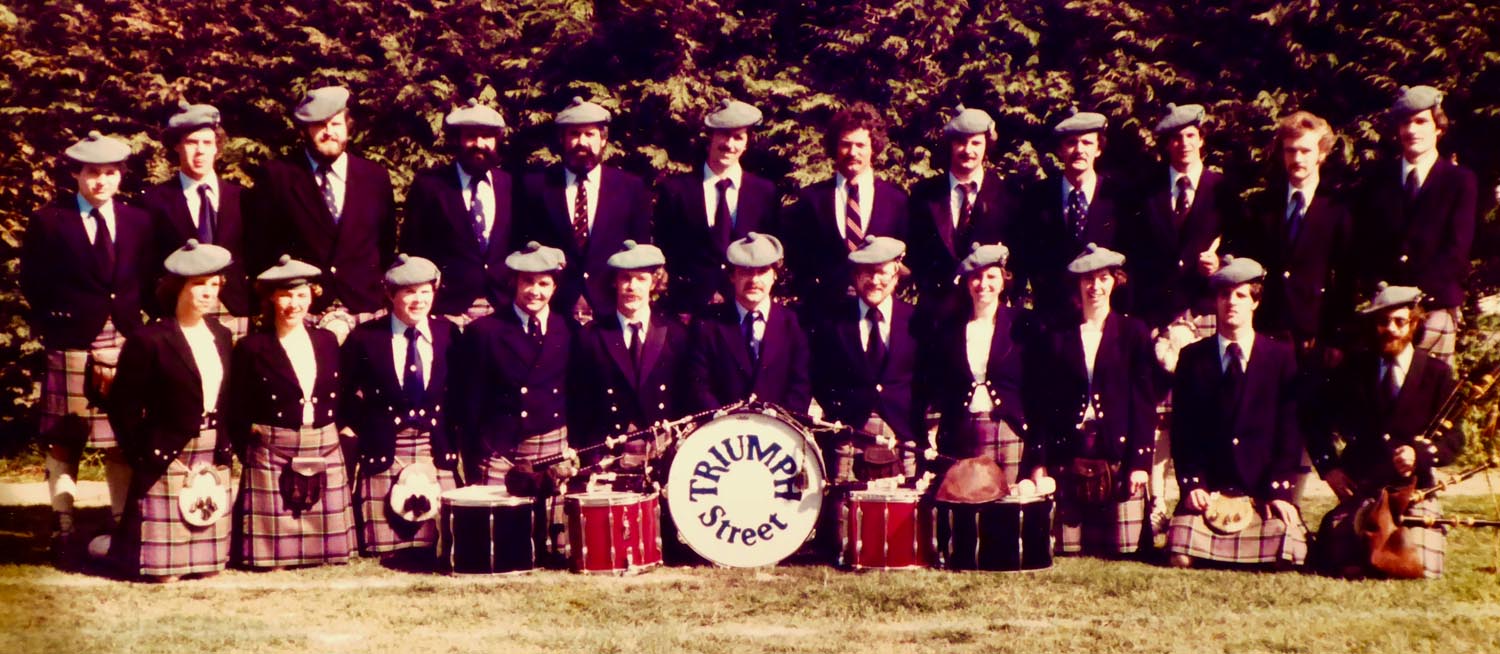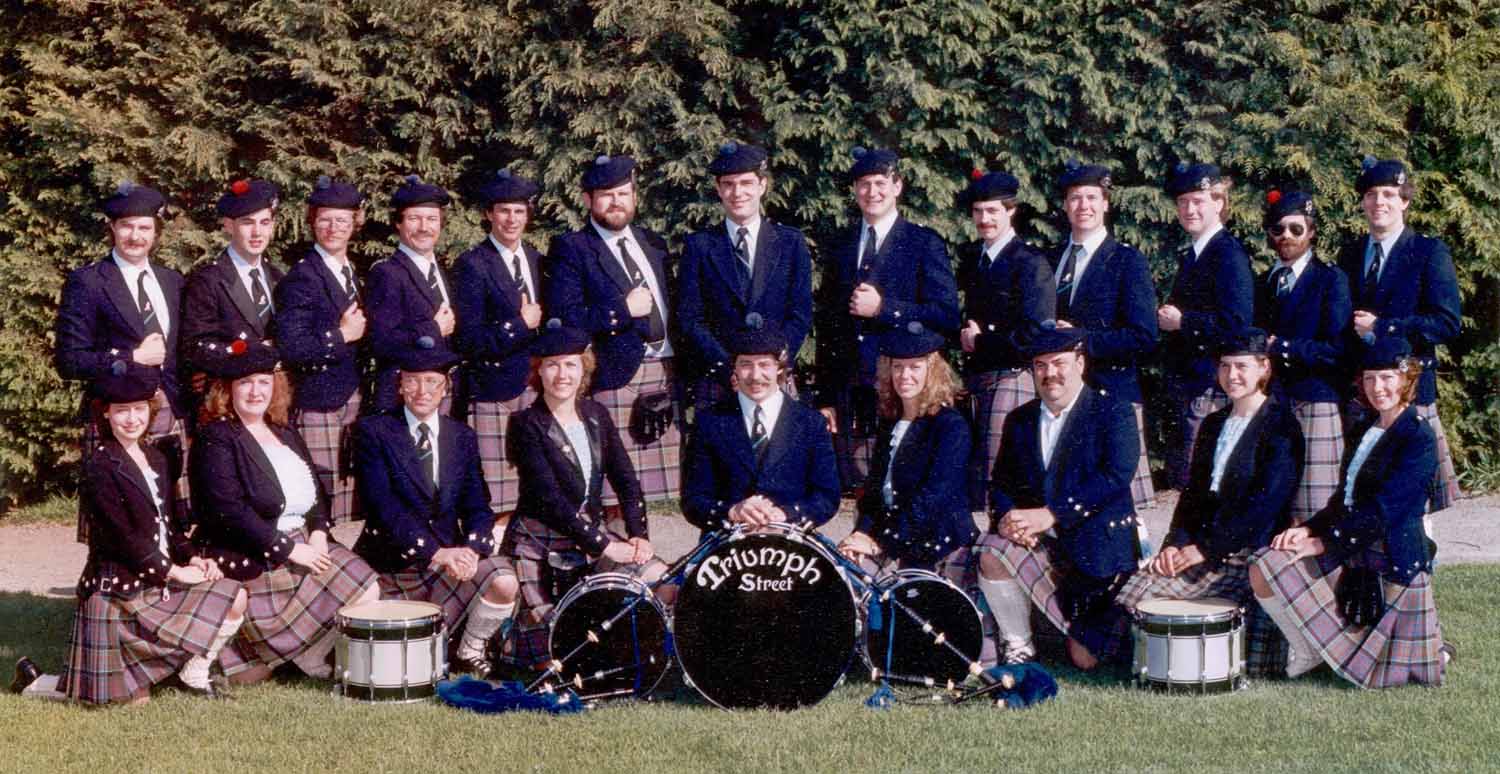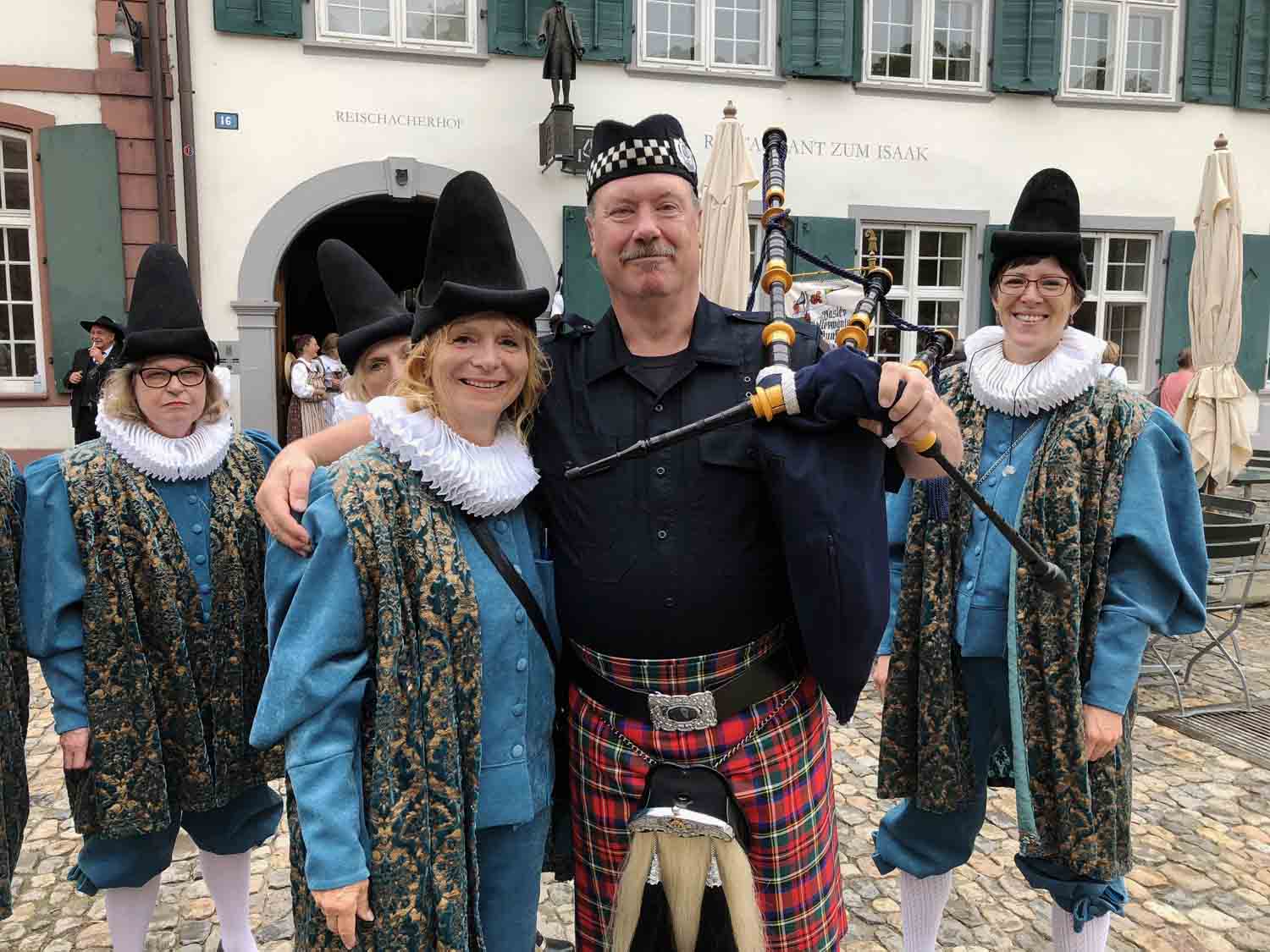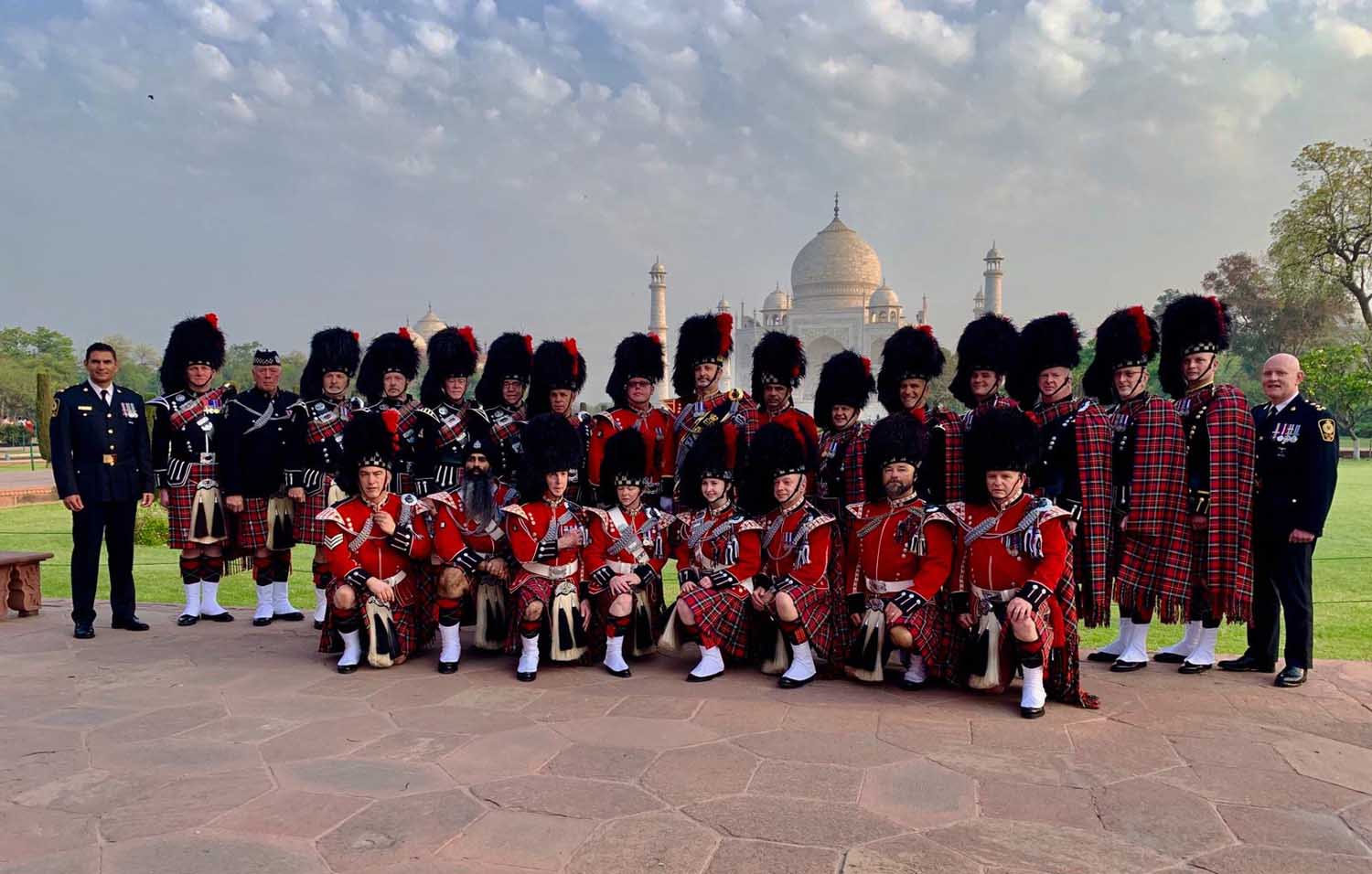A Second Time Around: one piper’s 30-year journey back to enjoying pipe bands again
By Owen Reid
I was jolted from a deep sleep as a thought raced through my veins: pipe band. My spouse was unconscious until I took my index finger and poked her in the shoulder. The usual response to my action of waking her before her alarm went off was always met with threats of dismemberment. But luck was on my side that morning and I was asked “What?”
“I want to join a pipe band.”
“What?”
“I want to join a pipe band. Not a competing band, but some sort of pipe band.”
“Not a competing band – okay, then.”
That was easy. But in reality it wasn’t. I hadn’t played in a band for 31 years. During that past month I had decided to retire from my career in industrial sales. There was going to be a need for a life past working. Somehow, from deep in my brain stem came the idea of playing in a band again.
Did I have the skills necessary to play in a band again? Did I have the commitment? Would I have the support from my spouse to be away for weekends and weeks at a time? And the big question: Would any band want me?
My life as a piper started 51 years ago at age eight with seven other hopefuls around a table at David Wilson’s mother’s house. I practiced on my chanter and a year later my father purchased a set of Hardies from J.T. McHardie’s on Seymour Street in Vancouver. I still remember the corrugated paper box they came in with the price written on the outside: $129.00. What a struggle it was to get them to rest on my shoulder and squeak out some notes. But I persisted and started competing individually. The classes were broken out into Novice, Juvenile, Junior, Senior Amateur and Professional. I progressed through them all.
The hours of practice accumulated and my skills improved. My band list started from the Saint Andrews & Caledonian (David Wilson’s beginning Group of Eight), the Seaforth Cadet Pipe Band (we all quit when they wanted us to get out hair cut as it was the early 1970s), The Richmond Pipe Band (Jack Lee was the leader/Instructor) and then culminating in joining the Triumph Street Pipe Band.
It upsets my spouse when I say 1978-’79 was the greatest year of my life. But it was. Even after getting married and having two girls, nothing compares to my first year in the band. I felt like a rock star.
I had wanted to join Triumph Street when I was 15 or 16, but was told by both my teacher David Wilson and my father that it was not an option as those guys were animals – and they were. I watched them at close range at the Highland games, I bought reeds from Hal Senyk and had some lessons from a couple of their members: Rob Menzies, Graham Davidson and Allan MacLeod. With overnight travel required for a couple of the games, I lied to my parents in telling them that I would be with Rob Menzies and it would be okay.
It was anything but okay. I loved the atmosphere with Triumph Street – party hard, play hard.

A couple of Septembers later I completed high school and found myself at Triumph Street’s first practice of the season. It upsets my spouse when I say 1978-’79 was the greatest year of my life. But it was. Even after getting married and having two girls, nothing compares to my first year in the band. I felt like a rock star. The success at the World’s in 1979 is history and has been well documented in other articles. Being part of the sound that the band put out was a massive pleasure that I will never be able to duplicate in my time on this planet. The magic of Triumph Street’s sound stamped a permanent mark on me. And the life-long friends I have made during that time are a huge reward as well.
Eight years in a Grade 1 pipe band go by quickly. Life changes. Marriage, career and responsibilities start to pile up. When I was 18, it was punch-in at work on time, gas in the car and go to band practice. At 26, life becomes complicated. The decision to move on with life without bagpipes was difficult and that’s an understatement. At the Vancouver Expo 86 Highland Games, I took a big breath at the end of our medley and made an effort to remember all that had happened to me in the past with Triumph Street.

The next 31 years went by fast. Two girls were born, a career spawned income, home renovations undertaken and a standard lifestyle was experienced. I played my pipes throughout this time sporadically. I’d massage the cane drone reeds to life and play for a month. Six months would go by and there would be a wedding to play for, so I’d go through the process again. I’d shave down Hal Senyk’s left-over reeds as my stamina was compromised. And then that morning happened when the spark of joining a pipe band zapped me.
What bands were out there? Competing band (I never really ruled that out, but don’t tell my spouse) or performance band? Did I want the first option? I’d been there, done that. In reality, I just wanted to play. Seaforth Highlanders? Vancouver Police Pipe Band? JP Fell? Shrine (David Wilson was running that collection)? Delta Police? BC Regiment Irish Pipes & Drums, RCMP “E” Division Pipes & Drums?

In Vancouver, we have options, thanks to the large piping and drumming community. It all stems from the massive Scottish immigration that occurred throughout the 20th century. Those immigrants started something in this province that gave birth to world champions in both individuals and pipe bands. The BC Pipers Association is run by tireless volunteers who organize events and keep the culture moving forward.
I had to set parameters. My working life had some serious commutes and I was tired of fighting traffic. If I had to cross two bridges (I live in North Vancouver) and travel more than an hour each way, that wasn’t an option. That eliminated the Delta Police and the RCMP bands. Online information is valuable to a certain point, but I had to go and see, listen and meet the other options.
The Vancouver Police Pipe Band had a reputation in the ’70s and ’80s, but I knew a couple of their players. Sandy Marshall was the original pipe-major of Triumph Street until work commitments knocked him out. Sandy is the pipe-sergeant of the Vancouver Police and a semi-familiar face I had met at Triumph Street reunions. I contacted the pipe-major, Cal Davies, through email and asked if I could come out for a listen.
The Monday night I arrived and stood at the side of the gym at the Justice Institute in New Westminster (one bridge travel). Everyone seemed normal and curious about who I was.
The question was asked: “When did you last play in a band?” “Thirty-one years ago” I replied and I could see the eyes rolling. I found out later that the pipe-major Cal asked Sandy “If Owen was any good?” Sandy replied, “Well, he used to be.” The usual trip to the pub after practice added to a comfort level with me listening to the banter and getting asked questions about my background. I started to get a little interested in this group.
I decided to go for a second listen the following Monday. Panic hit when Sandy called me in the morning of practice and asked if I could bring my pipes. Crap! I needed at least a new chanter reed. A quick call up to Terry Lee at Tartantown begging for an easy reed and I’d be up at lunch to pick it up. Terry was great in getting me a quality reed that was perfect on first blow.
That night, I warmed up with the rest of the guys before we assembled into the circle. Nervous? Yes, but the process was familiar. However none of the tunes were familiar to me, so I stood on the side waiting for my chance to play something I knew. Cal barked out a set of two-part reels I knew so I joined in. Sandy was tuning the pipes as we played and stood behind me. As I got to the second part of the first reel, he tapped me on the shoulder and nodded for me to join him out in the hall. Kind of confused, I stopped playing and followed him.
“Do you want to go to China?” he asked.
“What?”
“Do you want to go to China?”
“Yeah, sure,” and I headed back out into the gym where the rest of the band was.

All the Vancouver Police music is posted on their Team Snap website. There were a lot of tunes I didn’t know. I printed them out and headed downstairs every night to my office for an hour or more to get on them. There were a few curse words directed toward my original teacher David Wilson as to why hadn’t I ever been exposed to this music. The two-part reel set and a jig were the only tunes I knew. The list of the unknown tunes was a long as a 1960 Cadillac. The first tune I tried was “MacKenzie Highlanders” – easy, but I had to invest the time.
I didn’t miss a practice and that helped. But my challenge was memorizing the extensive catalog. I began to worry that my rugby concussions had caught up to me and I would never be able memorize any new tunes. I’d be stuck playing only the tunes I knew from the ’70s and early ’80s. The band was leaving for China in the fall and I wanted to be on that plane. I dug in and did the work until I had them all down. Three months after that fateful morning of making the decision, I never stood back when the band played.
China was a great experience. Nothing worthwhile comes easy. The band’s performance was complemented with the Shot of Scotch Highland Dancers. We performed at the 5th Nanchang International Military Tattoo (see YouTube, and it was also beamed into 250 million Chinese homes) and other events in the city. Great accommodations and the opportunity to see a part of China were all part of the package. We played in one parade that had 100,000 (or was it 200,000?) and the crowd went crazy when we played “Jasmin Flower.”
The following summer’s trip was to Basil, Switzerland, for the tattoo. I’d never played in a tattoo before as all my focus in my previous life was on competing in Highland games. There is a different skill set required. Before it was warm up, get tuned up, play your medley for five to seven minutes then off to the beer tent before and after massed bands. The Basil Tattoo was a different beast. No one gets cut because of a sharp F. You get the music six months before, two days of on-site rehearsals and a series of nightly performances (three sets including the finale) for over a week. Stamina and focus are key. The musical talent, including the Red Hot Chilli Pipers, Top Secret Drum Corps and others, was fantastic. One “act” was called to perform every night at the Cast Bar (only performers allowed) and the level of music is outstanding. The Vancouver Police were one of the few asked to perform and we knocked it out of the park. (P.S. – the bar was open until 6 am every night.)
I don’t understand why more pipers and drummers who “retired” from competition don’t look to play in a performance band – any performance band. There must be thousands of sets of pipes sitting under beds or on the top shelf of closets that are aching to be played.
My third year in the band brought a different kind of trip: India. With sponsors lined up and a list of performances mapped out, the band spent 12 days travelling in northern India. The Wagah Border Crossing, Taj Mahal, Canadian Ambassador’s House, Golden Temple and other exotic locations had me stop in my tracks more than a few times to give myself a shake to really understand where I was. And, yes, I got to play my pipes. The Vancouver Police Pipe Band travels well and the food was great. The band also gives you the ability to stay in the country after and will fly you home when you’re ready to get back. I stayed in India for five weeks and saw in some cases more than I wanted to see, but it was a great trip and a wonderful life experience. All because I play bagpipes.

Next year’s trip has not been decided, but I am committed to go wherever the band goes. I get to play at police graduations, different parades, individual gigs and almost anywhere else bagpipes are welcome. I am biased, but I don’t understand why more pipers and drummers who “retired” from competition don’t look to play in a performance band – any performance band. There must be thousands of sets of pipes sitting under beds or on the top shelf of closets that are aching to be played. If you have the slightest twinge of getting back into the game of playing again, I have the following recommendations.
- Get buy-in from your spouse. Divorce is expensive.
- Go out to different bands’ practices and see for yourself which could be a fit for you. I worked with many jerks in my career, and I didn’t want to work with any more jerks in my pipe band career. Trust your gut. If it doesn’t feel right, then it isn’t.
- Meet with the pipe-major. He might be a jerk. He might end up being your best friend or something between. Talk to him and ask hard open-ended questions: What are the band’s goals? How often do you bring new music to the group? What are the band’s travel plans in the next year? Two years? Five years? What’s the band’s schedule? Do I have to try out? What’s the band’s turnover? Do you need new members? Make a list of questions. You’re managing the interview.
- Invest in new technology. I buried my ancient L&M elk hide bag in the garden and replaced it with a Bannatyne-Willie McCallum Custom size. No animals dug up the old bag, as I should have taken it to the hazardous materials dump site. The cane reeds were replaced by the best synthetic reeds (don’t cheap out on these) and for the first time in my life I installed a water trap. My 1930s Hendersons sound great, are easier to play and with little or no maintenance required. All these new “inventions” make me feel like I’m cheating the system.
- Once accepted into an organization, work harder than you ever have to learn the tunes. You need to get your skills back and the only way is hard work, every day with no excuses. Life is short.
I feel fortunate to be playing again. There was a long break between bands and I lived my life to a certain extent with a great partner and great children. But when it comes down to it ask yourself this question: Is there anything in life that can match playing in a pipe band?
I’m lucky that it’s my second time around.
Owen Reid was a member of the Grade 1 Triumph Street Pipe Band of Vancouver in the 1970s and ’80s, and played with the band when it placed fifth at the 1979 World Championships. He took 31 years off, only to rediscover the joys of pipe banding by joining the non-competing Vancouver Police, and now travels the world with his band mates. He lives in Vancouver.
Did you enjoy this excellent article? If you’re not already a subscriber to pipes|drums, please consider subscribing or donating so we can keep things like this coming to you. pipes|drums is nonprofit, and all proceeds go to the maintenance of the magazine. Thank you for your support.
Related
 Triumphant and Victorious – 1979 a historic World’s, 40 years later
Triumphant and Victorious – 1979 a historic World’s, 40 years later
July 24, 2019
 Triumph Street at the 1979 World’s
Triumph Street at the 1979 World’s
June 24, 2019

Great article that mirrors my own experiences, right down to investing in the new technology. I was out of piping for more that 20 years before joining the RCMP Pipes & Drums in Ottawa. You couldn’t ask for a better group of people, and I have had the great fortune of playing with them on a China tour and at the Edinburgh Military Tattoo. There have been many other fantastic events closer to home too.
For anyone wondering whether to rejoin a band or not (or who has ex-player friends to bring back into the fold) – just do it! You/they won’t regret it. It’s never too late. There has never been an easier time to get (back) into piping, from the much more user-friendly kit, to the vast resources available online (including this quality website!), to the ability to order supplies from around the world with the click of a mouse.